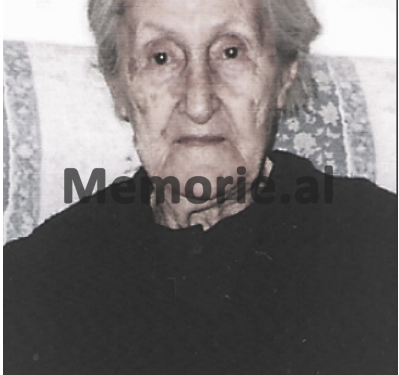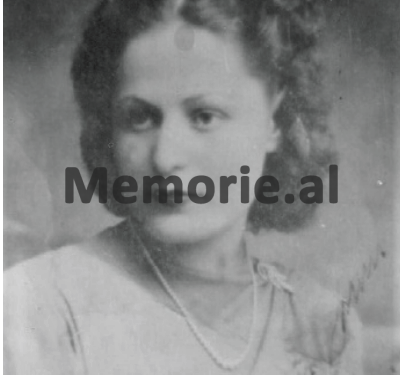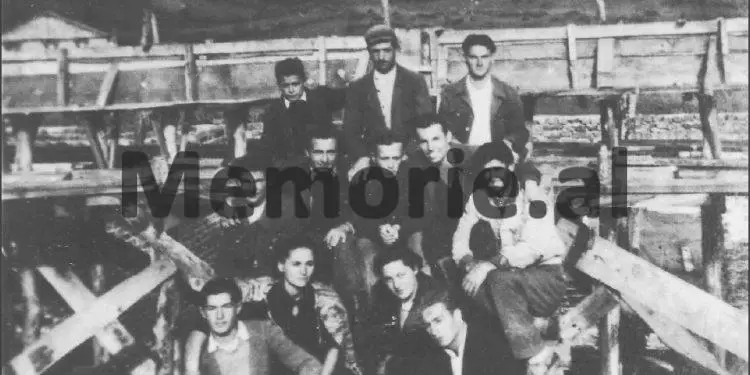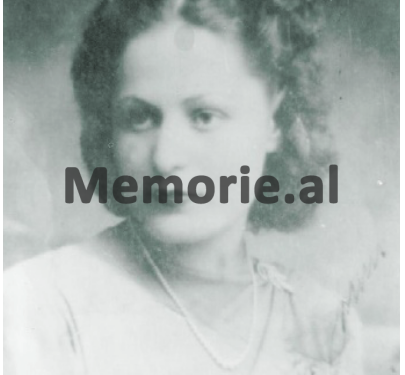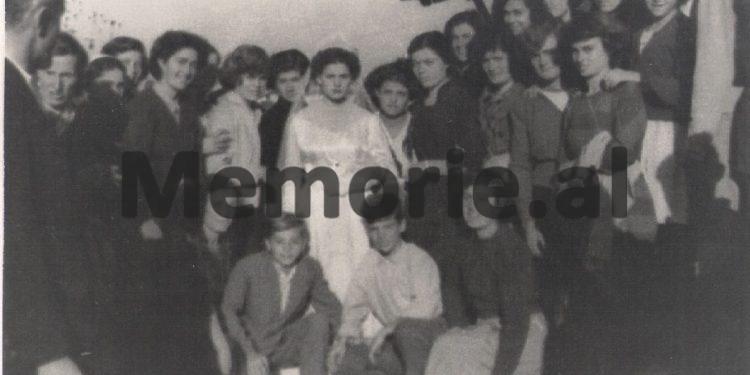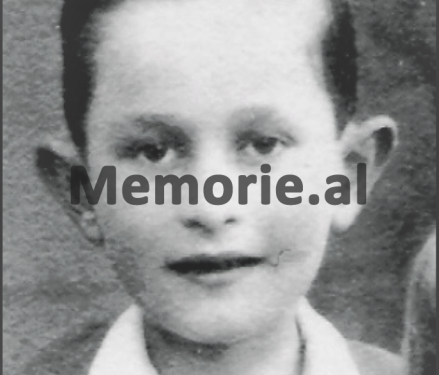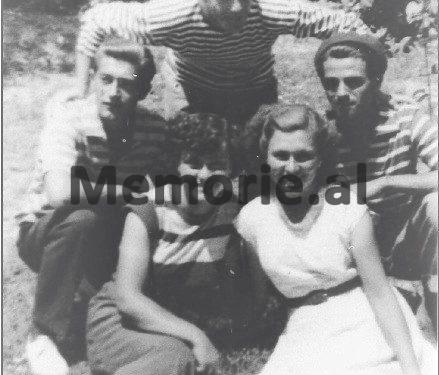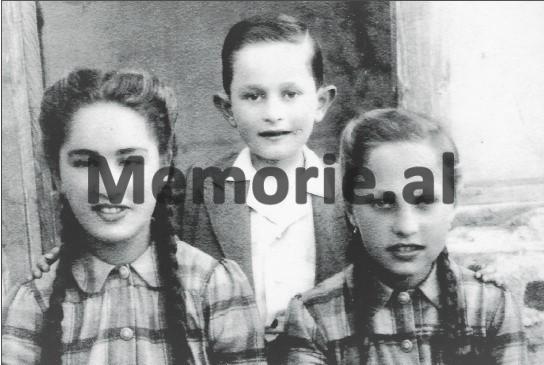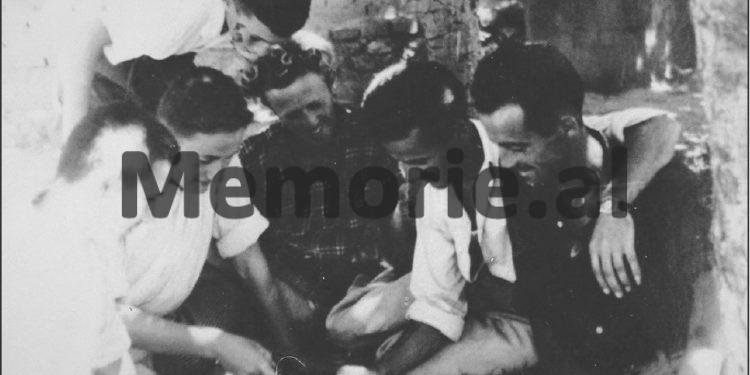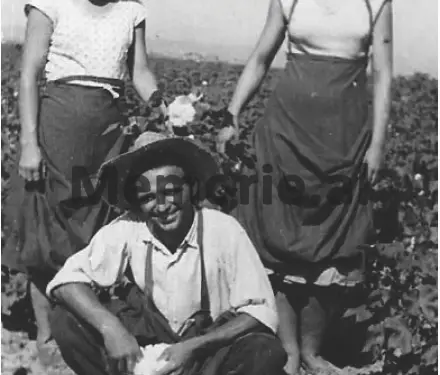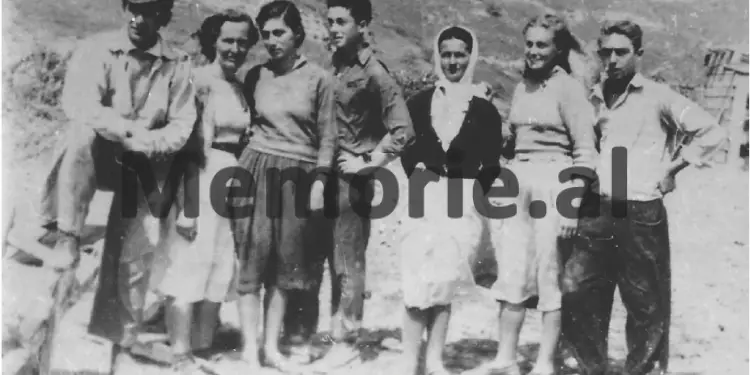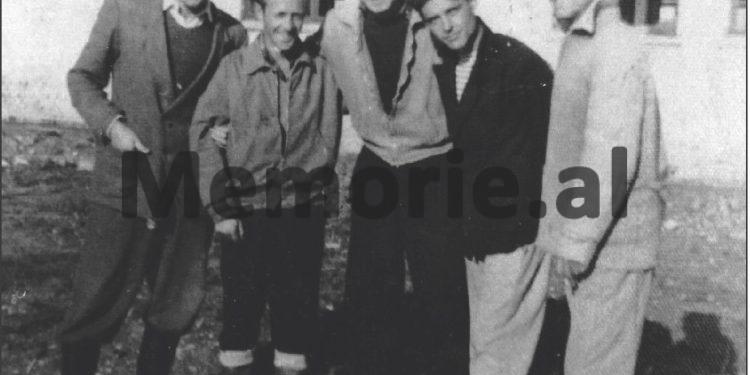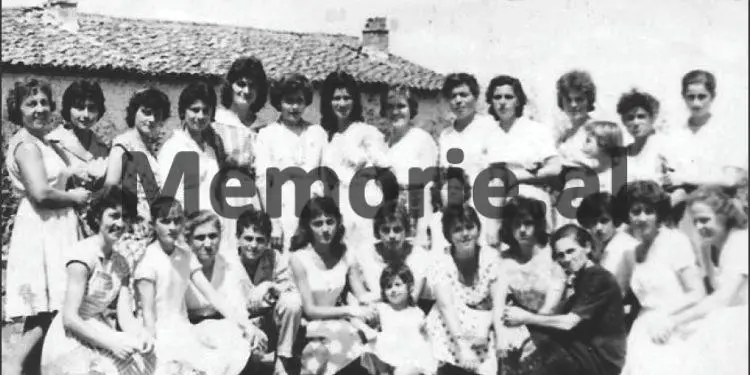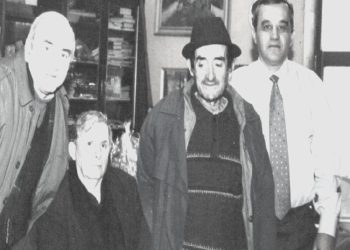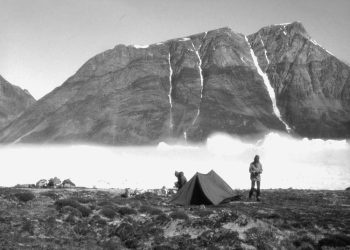Fatbardha Mulleti (Saraçi)
Part fourteen
Memorie.al / publishes some parts from the book ‘Calvary of women in communist prisons’, by Fatbardha Mulleti Saraçi, (granddaughter of the famous former prefect of Tirana, Qazim Mulleti), whose family since 1944 until 1991, was persecuted by the communist regime of Enver Hoxha, where Fatbardha’s father, Haki Mulleti, a former senior state administration official from the 1920s, was imprisoned and interned by his family, until as he died in the hospital of Tirana, poisoned by the State Security. In her book ‘The Calvary of Women in Communist Prisons’, which is the fruit of several years of work, the author has masterfully described the unknown stories of some of the Albanian women and girls who suffered in prisons and internments in the dictatorial regime of Enver Hoxha, started by her mother, Pertefe Mulleti, and in turn: Marie Deda, Hajrie Kazazi, Kushe Seknej, Mrike Pali, Zyliha Rusi, Roza Jakova, Fatime Dilaveri, Hatixhe Pipa, Marije Gjoka, Angjelina Topalli, Hatixhe Kopliku, Nafije Kop Bushati, Budije Bushati, Adile Kazazi, Antonela Dostanishta, Nafije Stërmasi, Luçije Saraçi, Adile Meta, Qeuthere Meta, Feride Damnori, Vitore Ashta, Fetije Vuçiterni, Zehnije Gjylbegu, Xhyhere Kazazi, Luçije Malaj, Leadije Kazazi, Sadije Kazazi Hava Repishti, Luçije Kurti, Rukije Bushati, Shaqe Logoreci, Qamile Myftija, Marie Ndokëllia, Rozë Çefa, Çile Staku, Shaqe Marku, Lajde Arapi, Lutfije Barbullushi, Syme Muka, Zenepe Kraja, Fahrije Kazazi, Naxhije Plari, , Lizë Vukeli, Bade Kjaraj, Hava Baçi, Xhehadire Boriçi, Vitore Kalaj, Katerina Benusi, Sofije Baja, Lenë Pjetri, Dava Markagjoni, Mrika Markagjoni, Marta Gjonmarkaj, Bardha Gjon Markagjoni, Kristina Gjomarkaj, Çelestina Pervizarki, Kune Miraka, Sultana Dine, Vera Dine, Agime Dine, Hamide Çela, Vera Dine, Kadrije Cami, Sanije Sulaj, Meliha Sulaj, Vashe Kola, Prena Llesh Gjeçi, Gjystina Seku, Ilda Melgusha, Agime Pipa (Aranitasi), Terezina Pali, Liza Pali, Adile Boletini, Nasibe Kazazi, Ana Daja, Dila Zef Ndoja, Zyraka Mano, Shanisha Dosti, Zojë Gjeloshi, Drane Stakja, Elena Luli, Sabiha Kasimati, Marije Deda, Marije Shllaku, Biçe Pistulli, Sadije Kazazi, Gjyzepina Çoba, Marta Doda , Frida Satedini, Vitore Kuka, Gjela Llesh Biba, Bardha Cub Marku, Liza Llesh Mali, Bardha Mark Bushkola, Marije Tuci, Olimbi Baruti, Angje Kovaçi, Bedrije Ashikja, Musine Kokalari, Motër Gjeorgjina, Liljana Radovani, Laura Keqi, M Mrike Zadeja, Angjelina Shantoja, Naime Koçi, Sheriar Sefa, Vitore Shllaku, Liza Gjon Voci, Nina Shiroka, Laje Mehmeti (RRema), Feride Beshiri (Quku), Hasije Ulqinaku (Quku), Sofije Kali, Çile Gjush Larja, Nurfezo Koprencka, Sanije Gjylbegu, Emilja Shest Bregu, Vida Radovani, Nedrete Pipa, Motrat e Osman Kazazi, Safete Jusif Sokoli, Çiljeta Simoni, Lutfije Buashati, Sadije Bushati, Olga Schëeizer Libohova, Evelina e Ndoc Naraçi, Geraldina Apony-Zogu, Hilda Zyma. Marie Rafael, Zade Muka, Rukije Bushati, Hajrie Vrioni, Emine Gjyrezi, Xhemile Beqir Komi, Hedije Dume Repishti, Syme Muka, Fetije Vuçiterni, Sebije Puka, Marjeta Serreqi, Dhurata Sokoli, Klara Miraka (Merlika), Asi , Liri Cenaj, Rudina Dema, Adelajde Miraka, Drane Jakja, Syriha Hasi, Aishe Gogaj, Luçija Kaçaj, Gjyljana Malaj (Pervizi), Nadide Kasaruho, Nadire Kërçiku (Peshkëpia), Shpresa Ballolli (Merdani), Makbule Frashëri, Misly Çrash Dervishi (Leka), Natali Arkandi Rozengolc (Pengili), Vigelmina Vitalij Kovaleshko (Veshi), Rukije Rama, Tefta Tasi, Liri Lubonja, Kozara Kati, Shpresa Ngjela, Vera Bekteshi, etc.
Continued from the previous issue
Martha and Mark Gjomarku’s wife
Mark John Mark’s wife, who was killed in the mountains during the anti-communist resistance, was paralyzed in exile and transported by vig to all the camps. He was exiled along with his children: Christina, Celestina and John. He died in exile in 1974, after 30 years of exile and paralysis.
Gjon Mark Gjomarkaj
(1938 – 2003)
When he was exiled, John was a child, only six years old. It was Mark’s son who resisted, fought against communism, to the point of sacrifice, was killed in 1947. His mother Martha was paralyzed from the first years of exile. Each time they transferred the patient, they carried him on a stretcher. Little John grew up having constant companions hunger.
Little John addressed his mother:
– Mother are you hungry, I’m not hungry?
The desolate mother understood what John meant by this expression, his endless hunger, and his boundless love for his mother. He grew up with a lot of love from his grandmother, mother, Aunts Martha and Bardha, as well as Sisters Kristina and Celestina. Growing up, John learned that he was learning Italian with Gardiner (who was also an exile). Little John hid the notebook under his shirt (so that the police would not see it) and went to his honored teacher. He taught very well. He learned French with Mr. Zef Gjeta (former Mayor of Shkodra in 1944), was exiled, while he learned German on his own.
The boy grew up and tried all the work camps, with the appeal twice a day, in the most difficult jobs and over long distances that he had to walk for hours to get to work.
Here is what John told, an episode of his childhood:
– I was at school. We used to take books from each other because we did not have them. In the history book, Enver Hoxha was photographed with ink. When I was holding this book, the camp policeman saw me. Every day as soon as I finished class, I was forced to show up at his office. He with the pipe of keys he had in his hand fell on my head …, I did not have to show, he pressured me…!
One day your beloved grandmother caressed me, her hand met the bumps on my head. They had become hematomas. I was forced to tell him the truth. The grandmother took the boy by the hand and they went to the police office …, she protected her little nephew.
The policeman says: – Remove the name of Gjon Markajoni from the boy, because he is…! But the brave old woman replied: – “We have a tradition of naming our ancestors; in no way do we change the name of the boy. But do not touch my son with my hand, because then you will have to deal with me …”!
With great difficulty he enrolled in the high school “October 18”. It was in 1956, it was the first year of life of this school. He was an excellent student, but a picture with his classmates could not be made. In the photos of the students of this school, the students who were interned, who came from the internment sectors, such as Savër, Plug, Gradisht ..!
The “declassed” students were so suffering that they felt that they had to avoid exposure, even in a photo of their schoolmates…!
This category of students did not have the honor to put the photo on the board “Pride of the School”, and no longer be given the right to continue their studies in our universities…!
John grew up and tried all the internment camps, with the appeal twice a day (morning and evening) in the most difficult jobs and as far away as possible, he had to walk for hours, to go to workplace. After 46 (forty six) years, in 1991 he returned to Shkodra, home. Gjon Mark Gjomarkaj, was appointed chairman of Caritas in Shkodra (by Ivan Dias – Vatican ambassador), who helped the city and Albania with humanitarian aid, then headed Caritas in Mirdita (led by the Austrians). There he helped repair churches, in particular opening schools and repairing them.
He was elected MP from the Republican Party in Mirdita. He got married …, but unfortunately, life stopped for him on October 19, 2003.
Kristina Mark Gjomarkaj
Kristina Mark Gjomarkaj was deported along with other family members. She was the daughter of Mark Gjomarku, who led the resistance against the communist system, who was assassinated in 1947.
Kristina tells us: – “I was 12 years old when we were sent to the Prru neighborhood of Berat. My mother was sick, she started having paralysis. The policeman kept in the dark to find out if the mother was really paralyzed (they thought it was not true!)
Because of my mother’s paralysis, I was 12 years old, expelled from school, and forced to work part-time. I was fired from my family, taken to work in Kuçova, with foreign women. In one room we lived 20 (twenty) women, they were from Dibra and Mirdita. The cops guarding us at night laughed, laughed, or rather cheered.
The desolate women had a lot of heat in those rooms (they were in the summer season), it was an unbearable heat…! They suffered while they (the rifle guards) mocked their suffering.
We slept on the ground; the planks were placed on the damp ground. I made the mattress I slept in as a bag; I fastened the clothes in my hands and feet, so that the frogs would not enter my body…!
With the sickle in hand, we were cutting the corn …, but accidentally I cut off the leg. It was night, my temperature went 40 °, I was alone, I did not have my mother near me, and they were all women I did not know. They rested on my head while I was not given any medical help!
I was working in a wheelchair, along the way she was pouring on me, because I was small, but the director and the captains were having fun with these scenes, they were just having fun with a minor who was suffering.
We, the internees, worked together with the prisoners in the camp, we walked for three, so as not to disturb the line. Pandi Anastasi was the captain of the prisoners and internees … one day he called a young bride from Kavaja, her husband had crossed the border, in a word, he fled Albania, he was 20 years old, and his name was Servete. He isolated Servete on the field, did not let any friend approach him, asked him to meet the norm …, tortured him … But she never gave up.
Those women who he managed to break, who fell into their hands, he gave them bread, while those who resisted, he left them without bread for three days…! A young boy, beat him one day a lot, discharged all the accumulated anger. They took the captain, gave him a reprimand for three months, but brought him back to the camp director..!
One day when I was returning from work, after a few weeks I saw my dear grandmother that I did not know, she was so weak, not even half of her was left…! She saw our sufferings, the little ones who were forced to work, the hunger that accompanied us at every moment, their two sons were killed, in the anti-communist resistance, Tuesday – my aunt was arrested, as well as the other aunt Bardha, dear uncle Deda “they were imprisoned … pain and misery everywhere.”
“In Berat – Kristina continues the story – they kept me for four years. They put us to work in removing the dead from the graves…!
In Tepelena I was hired to work in the transportation of wood. I was small, immature, the load of wood for me, was heavy, while walking the woods met the ground. The guards even laughed, mocked, laughed at this scene. We, the young girls, got us involved in transporting wet manure. There were times when we were sent to work at 12 o’clock at night. We usually left early in the morning; we had to follow the wood rate. We climbed the mountain of Gjolik, loaded wood on our backs and went down the loaded mountain, placed wood in the field; we had to do this work in summer and winter.
I was left without school in Berat, at the age of 16, when we were interned in Elbasan, I was sent to school. I was ashamed; I was the biggest in the class. I worked in Vidhas on the railway, where I had to work more at night. The prisoners worked by day, we the internees by night.
I participated in the planting of olives, in the keeping of bricks, in the construction of the Vlora prison. I ask my mother for the photos of my youth that I had taken in Savër, Lushnja – I told her. -Please show me the picture of youth! She replied:
-I am showing my photo, that I do not have it with my family, I have lost a lot during the transfers, our travels were endless. Here’s how he tells the story of photography:
– We were in Kamza in Tirana, where we worked tiling in the factory..! We found out that in the capital, the movie “Skanderbeg” was given..! One day, a boy from Shkodra, a driver, came to see his relatives. As soon as it got dark, we secretly left the camp, the driver took us with his car, we watched the movie, we had fun …, at this time I entered the studio and took a picture, but … when we returned, the alarm was given in the camp …, then we crawled and we entered the boat under the barbed wire..! We were led by Valentin Previzi, the man who had graduated from the Military Academy in Italy. Thanks to his instructions, we were able to enter the territory of the camp, while the men who captured them beat them as usual.
The internment continued for tens of years, I grew up, now I work in the fields of Myzeqe, as in Savër, Gjaza, in tillage, weaving, cotton harvesting, work in the sun and in the rain, in the cold or in the heat of the summer sun, with appeal twice a day. During the conversation she tells me an event, when she was 12 years old in Vlora:
– I needed dental treatment and the police escorted me to the dentist, he was equipped with a rifle and came after me …, the guard with a rifle … the street children insulted me by shouting “The girl who stole”. All the time I cried, everywhere you humiliated me, you cried, I turned to my mother, who was paralyzed, only she with her gaze, with that hand that put her sweetly on the head, to remove the suffering, the stress we were experiencing since childhood, but which has remained in my memory: We are in Tepelena, it is the summer months of 1949 – ’50, ’51, ’52, they transported us with grass and fertilizer, we crossed the Dragot bridge, which was mobile , we went to get dry grass, they made us two, three roads, they did not allow us to stop, to drink water … we told each other about water!
With us 16-year-old girls was also Elena Bega (French, the wife of the swamp drying engineer, Maliq), who was allegedly convicted of sabotage. In a moment of great fatigue, endless thirst, dryness, not only of the mouth, but of the whole body, the thought came to me to jump from the Dragot bridge …, with this action I wanted to punish the bad policeman, who tortured us, who did not allow us to drink water … but my friends, in particular Lajde Miraka, did not accept, she told me “I am a single girl, parents …”!
I was small, I was very desperate, I wanted to kill myself, at the same time the police…! But even this moment passed, my friends Lajde, Gita Luka, etc., showed that they were young in age, but prematurely grown in thoughts…!
This action was found out by Lekë Previzi (my cousin), an intern, who was an artist and said to me: -Kristina! In no way do not accept death, but we must resist …, that we will survive, hope in the future, it keeps us alive…!
When we were sent into exile in Savër, Lushnja – continues the story of Mrs. Kristinë – we received permission from the police of the center of Savër, permission to go to the city of Lushnja. We were walking on the street, at any moment I turned my head back, it seemed that he, the policeman, was following me. In Savër I was appealed twice a day, morning and evening.
Years passed, I am in Myzeqe – Kristina continues the story – we worked on the water canal, it was the Kaloshi sisters (Avidana and Dozia), Veronika Dosti and me. It was December, it was raining. Passing over the collector, Veronika passed, while I fell into the water, I was drowning; I had just turned 20 years old my …, but Avidia pulled me out. In those moments when I was taking myself, I say to my friend -Why did you take me out? Why not let me die? All my friends, who were suffering like me, gave me heart and our motto was: “In no way accept death, let us resist …”!
This is how our life went. I got married in 1974; my mother died the next day. I started a family in Shkodra with Mr. Gjovalin Vata, who had spent twenty years in political prison, a man with a great spirit and golden hands.
I gave birth to a son, my husband died and he left me with the little boy, I raised him, this is the most beautiful gift of my life.
Finished her good story Kristin, that her eyes still have that beautiful glow of youth, those colorful circuses of her extraordinary iris. And I who write their life, go through the same grooves, live those emotions of our common paths and paths…!
Celestina Mark Gjomarkaj
This is what Celestina, Mark Gjomarku’s other daughter, who was ten years old when she was interned, tells.
– One day the policeman was reading the names of the women and girls, who were to be sent to the Vora brick factory, while reading came out and my name was Celestina Markagjoni, and then I had just turned fourteen.
At this moment, my mother, who was paralyzed and was sitting in a chair, which had been worked on by Dom Nikolle Mazrreku, who was also in exile, the desolate mother spoke to the guard: “-Don’t take my daughter away, she “She is small and there is no one to help me.” But I was kicked out of the group. My mother was paralyzed in exile. She waited all night for Marta, her sister-in-law, but she did not return, they had arrested her.
Celestine’s life was spent in exile, she says: -We are not stuck with water, that is, we lacked water and no other things. She does not talk much, but continues the conversation with me: -We were isolated, but with the internees in the middle of the country we were FREE, we got along very well, we understood each other. I got married in Shkodra in the family of Ndokë Halili, I gave birth to a daughter, which is the joy of my life.
In the cities I tried what it means to be lonely, among people …, it was a consequence of the class war, which continued with us for 46 years, that is, for almost five decades, we were children and grew old under communism.. .! / Memorie.al
The next issue follows




